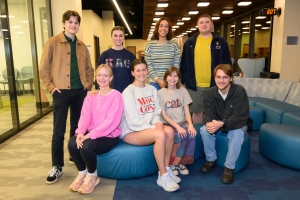
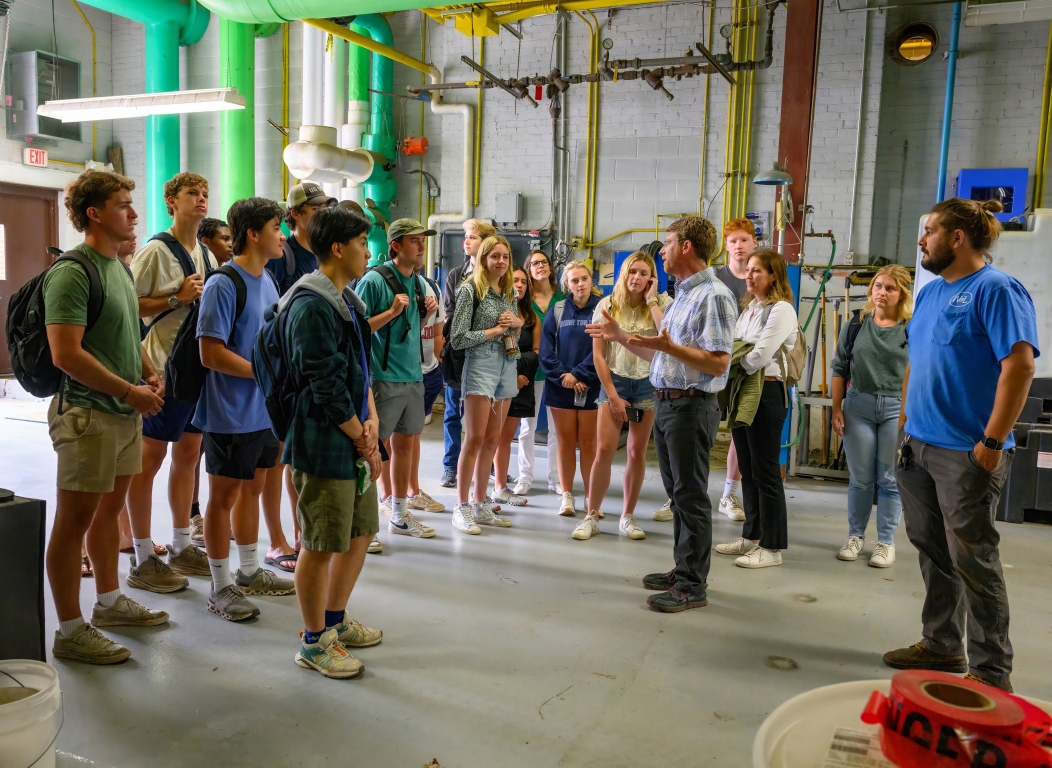
Taking Account of Sustainability Efforts W&L’s Spring Term Sustainability Accounting class takes a deeper look at the practice of corporations factoring in societal and environmental impacts alongside their financial bottom lines.
Traditional accounting involves analyzing and reporting financial capital through a company’s balance sheets and income statements. But in the last decade, a new subset of accounting has emerged in prominence; known as sustainability accounting, accountants have begun to play an important role in the measurement, reporting and auditing of corporate impacts on additional capitals, including humans, society and the environment. As 60% of consumers say sustainability is their No. 1 priority when making purchasing decisions, some companies are moving toward issuing sustainability reports alongside their financial statements, which outline their environmental, social and governance (ESG) impacts and give consumers and investors a holistic view of the company’s practices.
“There are real career opportunities to work in the field of sustainability accounting,” said Washington and Lee University associate professor of accounting Megan Hess ’97. “Students who want to work for public accounting firms or work with corporations on their ESG disclosures can get jobs in this important field of service.”
Denmark, which began requiring all corporations to report environmental and social impacts in the ’90s, was the perfect setting for Hess’ fall 2016 sabbatical. While there, she met with chief sustainability officers from various companies to expand her research focus to include sustainability accounting. As she learned more, she began conceptualizing the idea for a new course, which would become her popular Sustainability Accounting course. Historically a full-term course, this year marks the first time she taught it as a four-week Spring Term course.
“Spring Term is the perfect time to go deep into an important topic,” Hess said.
Hess’ class, which is cross-listed with environmental studies, attracts students from all levels — from first-years to seniors — and includes students who wouldn’t typically take a class in the Williams School of Commerce, Economics and Politics. The benefit of having students from different majors in one class is that each brings a wealth of knowledge from various subject areas and new approaches to the material.
“Sustainability accounting is the future. Our world is becoming more aware of the pressing issues regarding the environment, and companies are being held accountable.” – Maggie McBrayer ’24
During the course, students learned more about the concepts of corporate social responsibility and the theory of shared value; debated some of the core assumptions and the ethical dilemmas raised by market-based solutions to sustainability; studied various reporting standards for non-financial disclosures; and were introduced to the techniques used in performing life cycle analysis, or “green audits,” used in sustainability accounting. Students analyzed real-world case studies and engaged in classroom discussions as well as visited local businesses to see sustainability practices in action. For their final projects, students worked in groups to analyze the quality of the non-financial disclosures and the sustainability performance of a company of their choosing and presented their findings.
Tayshawn Smith ’27 plans to major in accounting with a minor in Latin and Caribbean studies. His interest in the Spring Term class stemmed from wanting to learn more about actions corporations can take to look beyond the financial bottom line and incorporate sustainable practices to lower their carbon footprints.
His favorite class case study was a deeper look at the Yasuni National Park in Ecuador. Considered one of the most biodiverse areas on Earth, the park sits under billions of dollars’ worth of oil, and the class studied Ecuador’s failed plan to receive international funding as compensation for preserving the forest and the complexity of measuring qualitative factors in sustainability accounting.
Yonderyear Farm is a 30-acre farm in Rockbridge Baths, Virginia, that specializes in growing certified, naturally grown cut flowers and raising grass-fed lamb. W&L alumni Kevin Green ’07 and Amanda Green ’06 returned to the area in 2015 to found the farm, after her work in the food and sustainable agriculture industries and his work for international non-governmental organizations.
“It was fun to be able to visit a sustainable farm and observe how they use their quality of product to generate revenue while being sustainable,” said Smith. “In Spring Term, we are able to take field trips and learn in and outside of the classroom.”
Another experience outside the classroom was a bit closer to home, as the class took an energy tour of W&L’s campus led by Jane Stewart, sustainability director, and Brendan Perry, university engineer, after reading a case study on W&L’s continued sustainability efforts and its establishment of a long-term Climate Action Plan, which was updated in 2019. The university’s goal is to be carbon-neutral no later than 2050, and Stewart highlighted some ways W&L is already taking significant steps toward that goal.
The first tour stop was the construction site at the outdoor amphitheater, where Stewart pointed out the first pipe laid to support the university’s eventual switch from steam heating to low temperature hot water heating. With this switch “we’ll be more efficient immediately,” Stewart said, but, even more importantly, the change will ultimately allow the university to eliminate natural gas — a fossil fuel — as a primary campus energy source. “This shift will be truly transformative.”
At the university power plant, which is the centralized location for both heating and cooling operations across campus, Perry explained the mechanics of the heat recovery chiller system that allows for both heating and cooling simultaneously, which reduces carbon emissions. The last stop on the tour was the roof of Leyburn Library where Stewart pointed out the three solar arrays on campus – on top of the parking deck, Lewis Hall and the student pavilion. She gave an overview of the university’s partnership with solar energy developer SunEnergy1, established in 2022, which allows W&L to purchase more than 22,000 megawatt hours of power each year — more than the annual electricity use on campus — from a 230-acre offsite solar farm in North Carolina. The move allows the university to significantly lower its greenhouse gas emissions and make progress in its goal of carbon neutrality.
Maggie McBrayer ’24 is a double major in accounting and politics, both within the Williams School of Economics, Politics and Commerce. She took an auditing accounting class with Hess last Winter Term and knew she wanted to close out her W&L career with Hess’ Spring Term class, as Hess “is an amazing professor who makes accounting enjoyable.”
The auditing class gave McBrayer foundational knowledge of performing corporate financial audits that she built upon in the Sustainability Accounting course. She appreciated that coursework around complex topics — such as carbon emissions, improper waste disposal and water scarcity — included actionable ways in which sustainability accounting can make an impact.
“Sustainability accounting is the future,” she said. “Our world is becoming more aware of the pressing issues regarding the environment, and companies are being held accountable.”
Rowan Blumenstock ’24 is a business administration major who plans to work at a commercial real estate brokerage following an internship with the Sands Investment Group. His business ethics course with Hess provided a framework for business sustainability practices, and he wanted to delve into the topic more thoroughly in the Spring Term class.
“Incorporating sustainability practices into the fabric of our business world is essential to protecting the natural resources we all rely on for future generations,” Blumenstock said. “One thing I will take with me in my professional career is that making a commitment to sustainability does not always need to be a massive investment or radical change. Progress can be made with simple, conscious efforts on various scales.”
“Accountants are often seen as the financial police, but the heart of the field is about holding corporations accountable,” Hess said. “It’s exciting to think about the field of accounting as being an area to effect change.”
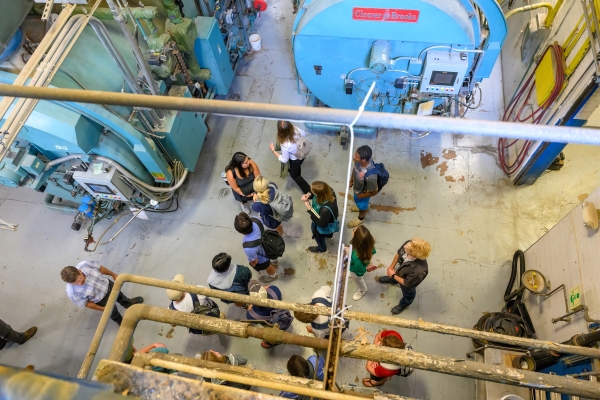 The class tours the university’s power plant, the central location of heating and cooling efforts on campus.
The class tours the university’s power plant, the central location of heating and cooling efforts on campus.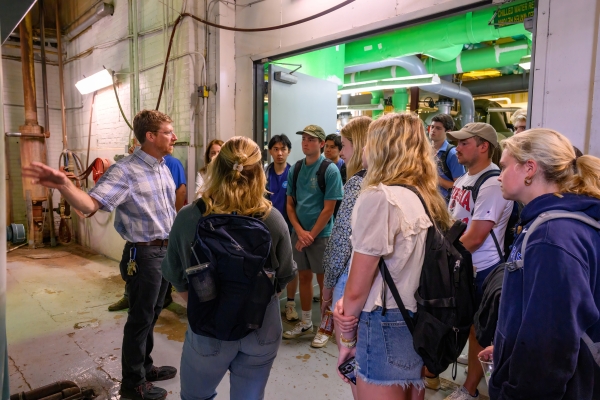 University Engineer Brendan Perry, left, explains how the university’s boiler system works.
University Engineer Brendan Perry, left, explains how the university’s boiler system works.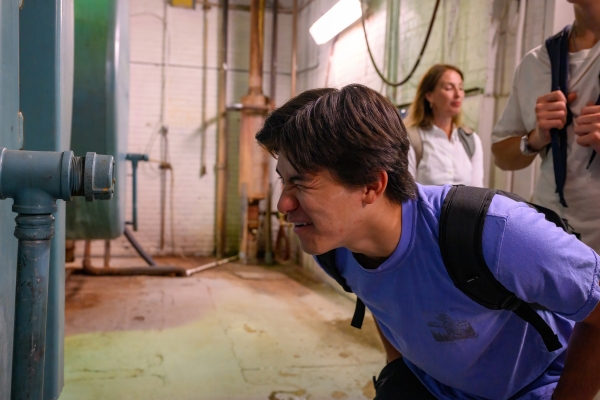 Ethan Post ’25 takes a peek inside one of the boilers.
Ethan Post ’25 takes a peek inside one of the boilers.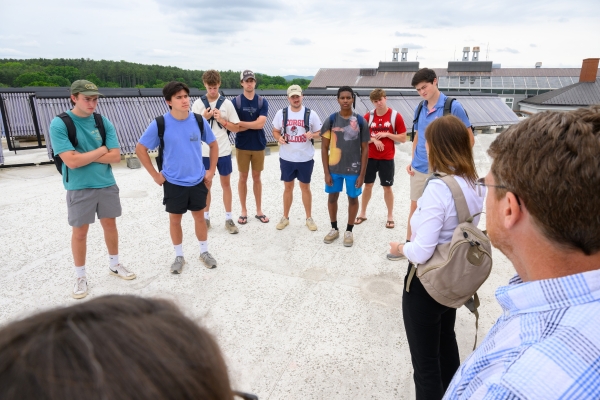 On the roof of Leyburn Library, W&L’s Sustainability Director Jane Stewart, second from right, points out the three solar arrays on campus and outlines the university’s move to solar energy.
On the roof of Leyburn Library, W&L’s Sustainability Director Jane Stewart, second from right, points out the three solar arrays on campus and outlines the university’s move to solar energy.
You must be logged in to post a comment.